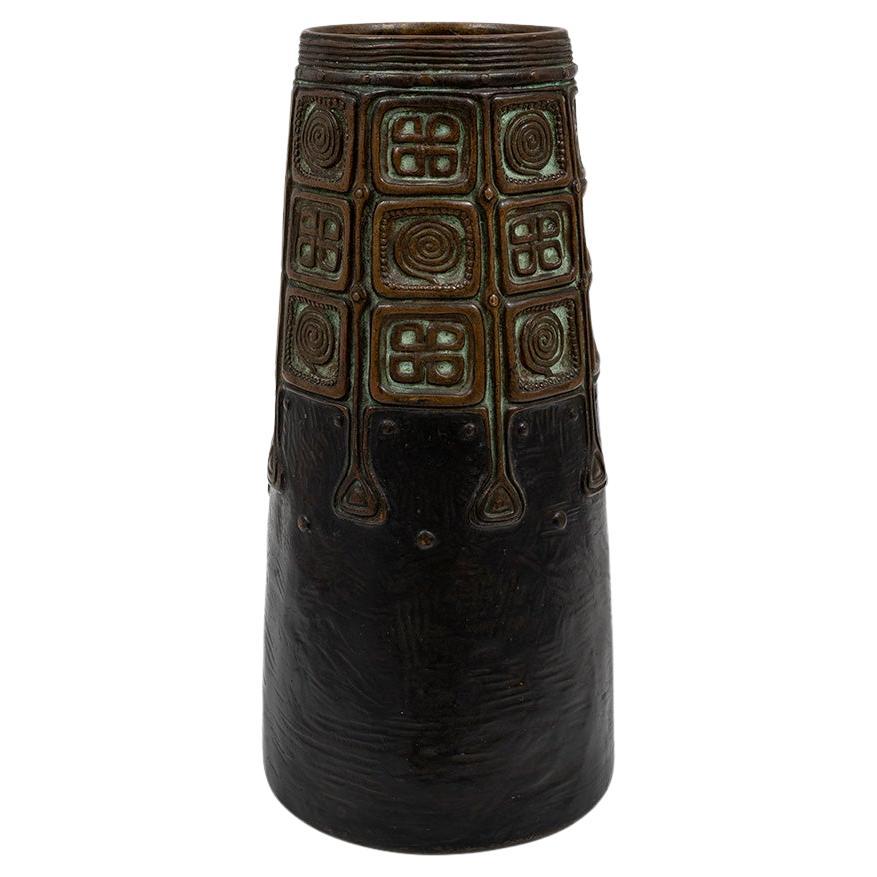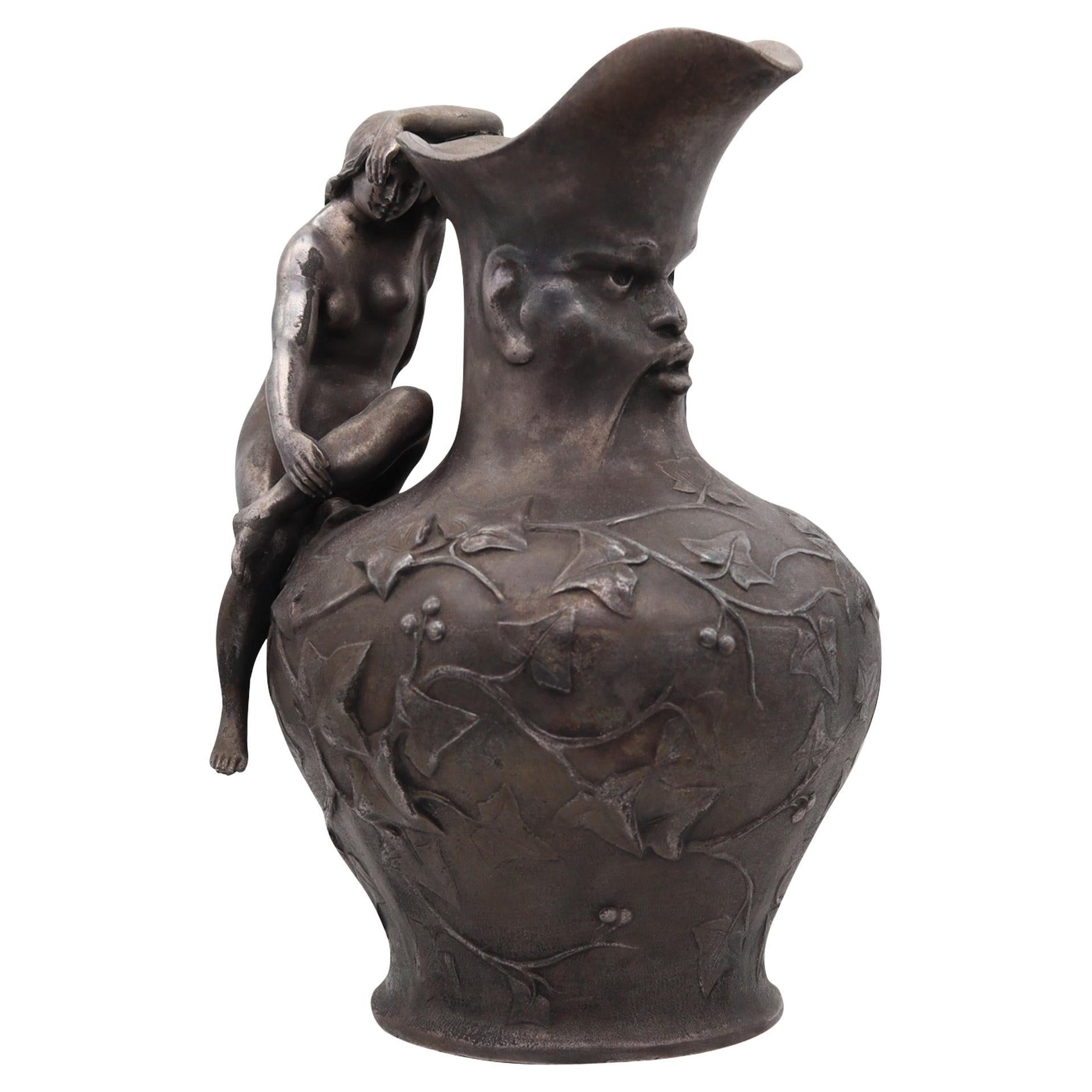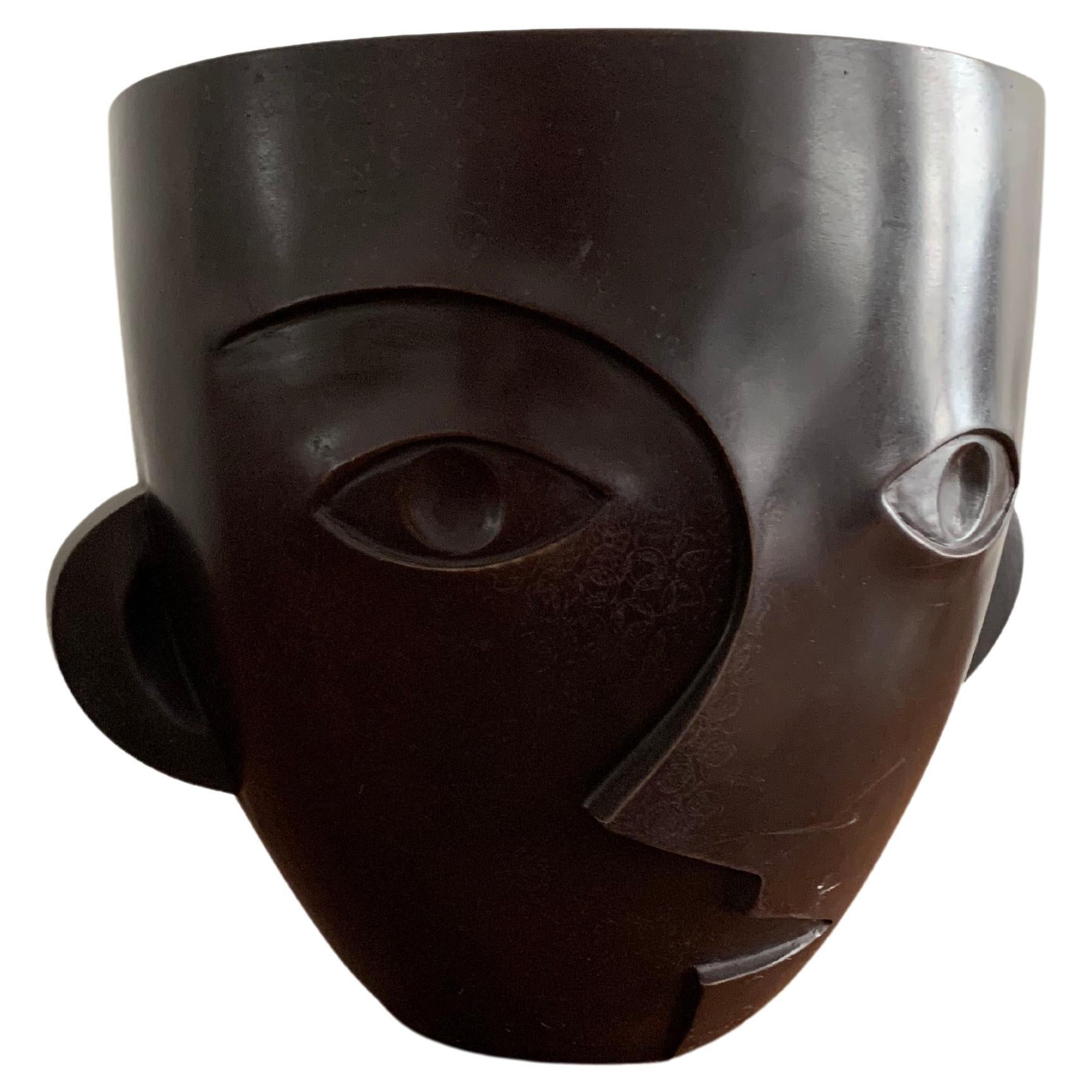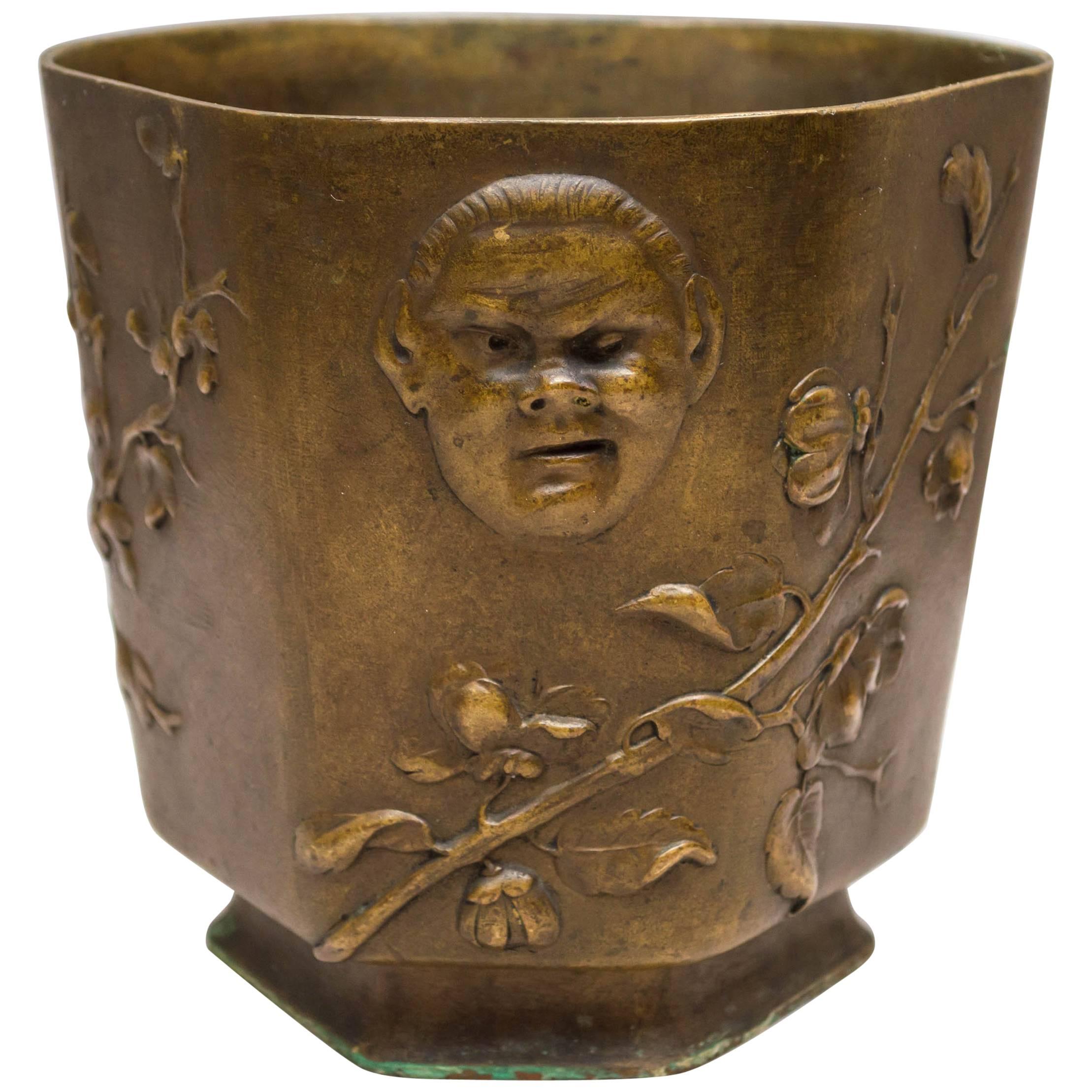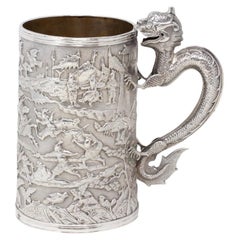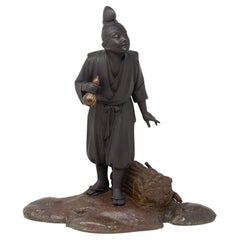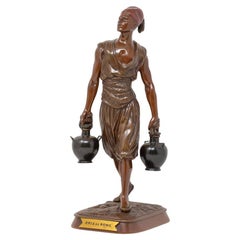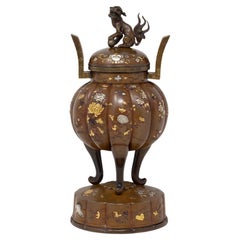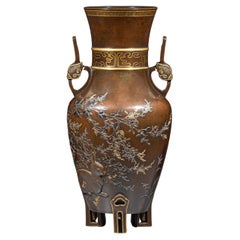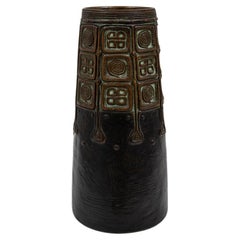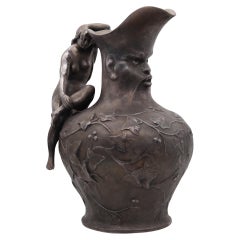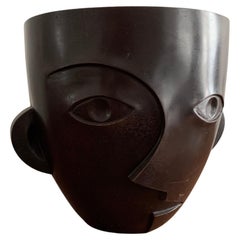Items Similar to China Man Bronze Tankard by Alfonso Canciani K. K. Kunst-Erzgiesserei
Want more images or videos?
Request additional images or videos from the seller
1 of 18
China Man Bronze Tankard by Alfonso Canciani K. K. Kunst-Erzgiesserei
$7,743.47
£5,600
€6,599.17
CA$10,728.96
A$11,649.57
CHF 6,169.30
MX$142,790.32
NOK 76,347.50
SEK 72,144.34
DKK 49,253.49
About the Item
Viennese Secession Orientalist Bronze
From our Sculpture collection, we are delighted to introduce this rare China Man Bronze Tankard by Alfonso Canciani. The Bronze Tankard cast as a tankard modelled into a Chinese males face with handlebar moustache and tightly compacted hair tied in a plat acting as the handle of the tankard. The Tankard has a stable flat base and uneven opening to the top and is signed to the handle by the foundry K. K. Kunst-Erzgiesserei (K. K. Art ore foundry) and was designed by Alfonso Canciani. The Bronze Tankard dates to the Viennese Secession movement (parallel to the Art Nouveau period and Jungenstil ) Circa 1905.
Literature documented in the catalogue of artificial bronzes of the K. K. Kunst-Erzgieserei : Branch of the Berndorfer Metalwareen-Fabrik Arthur Krupp Vienna, IV. Gusshausstrasse 25. (Katalog über Kunstbronzen der K. K. Kunst-Erzgiesserei : Filiale der Berndorfer Metalwaaren-Fabrik Arthur Krupp Wien, IV. Gusshausstrasse 25) Page 78 Number 1309 “Vase
Chinesenkopf von R. Canciani 20 cm hoch.
Alfonso Canciani (Italian-Austrian, 1863-1955) was a famous Italian-Austrian sculptor of the period of accession to the Viennese Secession. Throughout his illustrious career he obtained a large amount of awards and recognition for his extremely high profile sculptures. Working between Italy and Vienna he jumped from the Viennese Secession to a more vigorous way of sculpting in 1910 focusing more on figures, busts and similar. He became a renewed Italian sculptor and many of his works now reside in museums and private collections around the world including in his home area of Cormons, Friuli.
K. K. Kunst-Erzgiesserei (K. K. Art ore foundry) was an art ore foundry founded in 1750 an. Throughout its 100+ year operation a large number of monuments were cast at the factory including Hellmer’s Goethe monument, Brenek’s bust of Emperor Franz Joseph (in front of the Berndorf City Theater, Austria) and Zumbusch’s Diana (now in front of Marchegg Castle, Austria) as well as another 90 monumental works for Vienna, Berlin, Hamburg, Madrid, New York, Sydney and Melbourne to name a few. The ore foundry was demolished in 1909.
Viennese Secession was an art movement closely related to Art Nouveau. It was formed in 1897 by a group of Austrian painters, graphic artists, sculptors and architects, including Josef Hoffman, Koloman Moser, Otto Wagner and Gustav Klimt. Alfonso Canciani was invited to join the secession after his notable works within the ‘Art Nouveau’ theme.
Jugendstil artistic style that arose in Germany about the mid-1890s and continued through the first decade of the 20th century, deriving its name from the Munich magazine Die Jugend (“Youth”), which featured Art Nouveau designs.
Art Nouveau was an international style of art and architecture, especially the decorative arts. It was inspired by natural forms such as the curves of plants and flowers. Other characteristics of Art Nouveau were a sense of dynamism, movement and the use of modern materials particularly iron, glass and ceramics to create unusual forms. It was popular between 1890 and 1910 during the Belle Époque period and before the First World War. It was a reaction against the academic art, eclecticism and historicism of 19th century architecture and decoration.
- Creator:Alfonso Canciani (Maker),K.K. Kunst-Erzgiesserei Wien (Manufacturer)
- Dimensions:Height: 7.09 in (18 cm)Width: 7.09 in (18 cm)Depth: 6.11 in (15.5 cm)
- Style:Vienna Secession (Of the Period)
- Materials and Techniques:
- Place of Origin:
- Period:1900-1909
- Date of Manufacture:Circa 1905
- Condition:Wear consistent with age and use.
- Seller Location:Newark, GB
- Reference Number:Seller: BWDDSD1stDibs: LU6971240929782
About the Seller
5.0
Gold Seller
Premium sellers maintaining a 4.3+ rating and 24-hour response times
Established in 2019
1stDibs seller since 2022
39 sales on 1stDibs
Typical response time: 3 hours
- ShippingRetrieving quote...Shipping from: Newark, United Kingdom
- Return Policy
Authenticity Guarantee
In the unlikely event there’s an issue with an item’s authenticity, contact us within 1 year for a full refund. DetailsMoney-Back Guarantee
If your item is not as described, is damaged in transit, or does not arrive, contact us within 7 days for a full refund. Details24-Hour Cancellation
You have a 24-hour grace period in which to reconsider your purchase, with no questions asked.Vetted Professional Sellers
Our world-class sellers must adhere to strict standards for service and quality, maintaining the integrity of our listings.Price-Match Guarantee
If you find that a seller listed the same item for a lower price elsewhere, we’ll match it.Trusted Global Delivery
Our best-in-class carrier network provides specialized shipping options worldwide, including custom delivery.More From This Seller
View AllAntique Chinese Qing Period Silver Tankard
Located in Newark, England
Good Sized Tankard Larger Than Usual
From our Silver collection we are pleased to offer this Chinese Silver Tankard. The Silver Tankard of typi...
Category
Antique Early 1900s Chinese Qing Sterling Silver
Materials
Silver
Japanese Bronze Okimono Sculpture by Yamamoto Kozan
Located in Newark, England
YOUNG MAN WOOD CUTTING
From our Japanese collection, we are pleased to offer this Japanese Bronze Okimono by Yamamoto Kozan. The Japanese Bronze Sculpture cast in Bronze with a natu...
Category
Early 20th Century Japanese Meiji Sculptures and Carvings
Materials
Bronze
French Bronze Figure by Jean Didier Debut
By Jean Didier Debut
Located in Newark, England
NAMED PORTEUR D’EAU TUNISIEN
From our Antique Bronze Sculpture collection, we are delighted to offer this French Bronze Figure by Jean Didier Debut. The figure named Porteur d’eau Tunisien (Tunisian Water Bearer) is exceptionally cast upon a slightly rounded plinth base with a natural textured surface. The figure stands bearing two pales of water dressed...
Category
Antique Late 19th Century French Belle Époque Figurative Sculptures
Materials
Bronze
Japanese Bronze and Mixed Metals Koro by Kumagai, Meiji Period
Located in Newark, England
From our Japanese collection, we are pleased to present this Japanese Bronze and Mixed Metals Koro by Kumagai, dating to the Meiji Period (1868–1912).
The koro is of distinctive sca...
Category
Antique Late 19th Century Japanese Meiji Metalwork
Materials
Gold, Silver, Bronze
French Aesthetic Movement Bronze Vases
By Ferdinand Barbedienne
Located in Newark, England
Decorated with Insects
From our Decorative collection, we are delighted to offer a pair of French Aesthetic Movement Bronze Vases. The Frenc...
Category
Antique Late 19th Century French Aesthetic Movement Vases
Materials
Slate, Bronze, Ormolu
Japanese Pair of Large Antique Meiji Period Bronze and Mixed Metal Vases
Located in Newark, England
Inlaid with Gold and Silver
From our Japanese collection, we are thrilled to offer a Japanese Pair of Meiji Period Bronze Vases. The Japanese Bronze Vases of elongated form each sur...
Category
Antique Late 19th Century Japanese Meiji Vases
Materials
Metal, Gold, Silver, Bronze
You May Also Like
Bronze vase depicting a rabbit in the moonlight
Located in Milano, IT
Patinated bronze amphora vase depicting a rabbit carved in takabori among lush branches in moonlight with gold iro-e takazogan inlays, shibuichi and shakudo attributed to the Takaoka...
Category
Antique Late 19th Century Japanese Metalwork
Materials
Bronze
Vase Gustav Gurschner circa 1906 Bronze Austrian Jugendstil Brown Patinated
By Gustave Gurschner, K.K. Kunst-Erzgiesserei Wien
Located in Klosterneuburg, AT
Vase with Celtic pattern, designed by Gustav Gurschner, manufactured by K.K. Kunst-Erzgiesserei Wien, ca. 1906, Austrian Jugendstil, Patinated Bronze, Viennese Art Nouveau
In the pe...
Category
Antique Early 1900s Austrian Jugendstil Vases
Materials
Bronze
Charles Théodore Perron 1900 Paris Art Nouveau Sculptural Pitcher In Pewter
By Charles Theodore Perron
Located in Miami, FL
Sculptural pitcher designed by Charles Théodore Perron (1862-1934).
The beautiful antique art nouveau pewter jug pitcher. Made in France around the 1900 by the sculptor Charles Théodore Perron (1862-1934). Crafted in solid pewter and decorated with a reclined naked lady similar to a mermaid, a mask and art nouveau organic motifs, all in high relief. The pitcher is in perfect condition without any damages or repairs. The neck is the face of what looks like a captain of a ship.
Period: Art Nouveau, Circa 1900.
Material: Pewter
Weight: 6 Pounds (2.73 Kg).
Measurements: 241 mm by 179 mm by 153 mm (9.5 x 7 x 6 Inches).
Hallmarks Stamped with the maker's mark and signed, "CH PERRON".
Charles Théodore Perron
He was a French sculptor that born in Paris in 1862. He was the pupil of Falguière, Roy Lequel and Louis-Auguste Hiolin...
Category
Antique Early 1900s French Art Nouveau Vases
Materials
Pewter
$1,888 Sale Price
30% Off
Anonymous Bronze Planter Pot Figuring a Asymmetric Face Brown Patina France 1980
Located in Paris, FR
Anonymous bronze planter pot figuring a asymmetric face brown patina, France, 1980
Good condition, some light scratches on the patina.
Not signed, or marked by Foundry.
Category
Mid-20th Century French Mid-Century Modern Planters, Cachepots and Jardi...
Materials
Bronze
Japonesque Bronze Cache Pot by Berndorf, Austria, (marked) circa 1890
By Berndorfer Metallwarenfabrik
Located in San Francisco, CA
Japonesque bronze cache pot by Berndorf, Austria, circa 1890. Nouveau with a Japanese decorative motif. Stamped Bergdorf over an E
Decorated with thr...
Category
Vintage 1980s Austrian Japonisme Planters, Cachepots and Jardinières
Materials
Bronze
$2,600 Sale Price
20% Off
Maitland Smith Bronze Art Nouveau Bas Relief Face Bust Handle Mantel Vase Urn
Located in Dayton, OH
Heavy vintage Maitland Smith Art Nouveau style bronze urn / vase / vessel featuring high keyhole handles with a ridged texture above a pair of femal...
Category
Late 20th Century Art Nouveau Vases
Materials
Bronze
$940 Sale Price
20% Off
More Ways To Browse
Antique Kunst
Josef Hoffman
Franz Joseph
Chinese Man Sculpture
Chinese Tankard
Antique Austrian China
Goethe Bust
Bronze Tankard
Ancient Greek Bronze
Antiques Torso
Art Deco Plinth
Art Deco Statue Ceramic
Art Nouveau Alabaster Sculpture
Balinese Wood Sculpture
Bas Relief Marble
Biscuit De Sevres Porcelain
Black Jockey
Blue Head Sculpture

